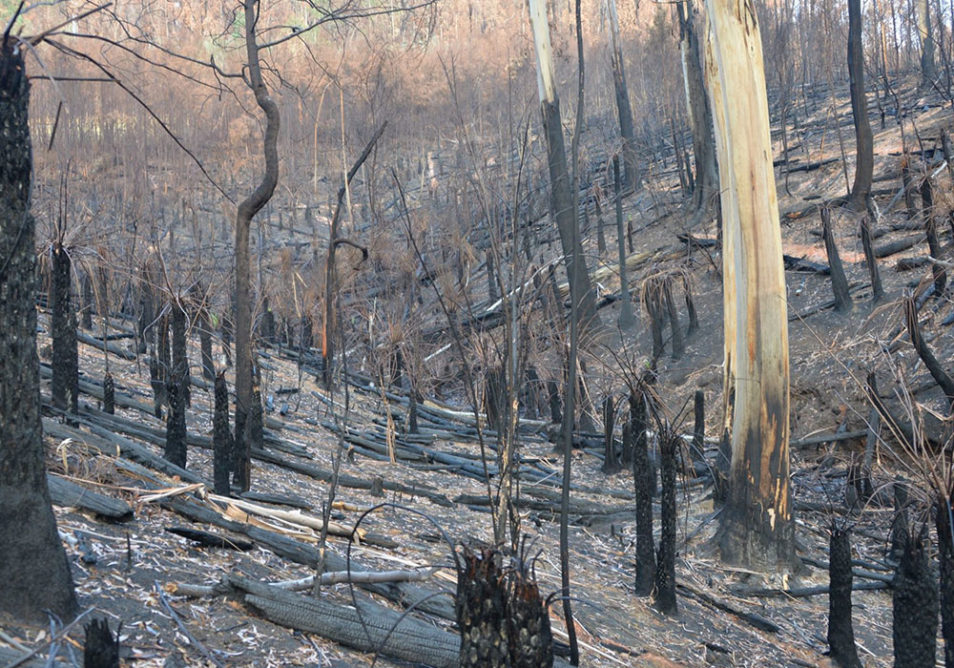Have you heard of eco-grief? It’s the emotional cost of ecological loss. Eco-grief is a by-product of natural disasters that can ripple through communities after a natural disaster.
We spoke to Fiona Martin, registered psychologist in our Health and Wellbeing team, about dealing with eco-grief.
“It’s absolutely reasonable to feel upset, frustrated, overwhelmed and disheartened. These are very ordinary responses to extraordinary circumstances,” she said.

Burnt bushland in East Gippsland Fern Gully.
Research shows people are increasingly feeling the effects of these changes in their daily lives.
Climate change, and the associated impacts to land and environment, has recently been linked to a range of negative mental health impacts. Since the start of the latest disasters, Fiona has noticed an increase in eco-grief.
“Climate change anxiety and eco-grief is starting to take a toll on people’s mental health,” she said.
“It’s challenging to separate work and personal feelings surrounding environment. Some of the sentiments our people are expressing are, ‘it’s like there’s no escape and whatever I do isn’t helping’.
“Eco-grief is a natural, though overlooked, response to ecological loss. And it is likely to affect more of us into the future.”
Wellbeing impacts
Other impacts include financial hardship, family and relationship problems, and increased signs of physical and mental health problems. Stress can have a direct impact on our wellbeing.
Some common signs of stress include a range of physical symptoms, from headaches and difficulty sleeping to feeling hopeless or worthless.
“Most people experience some of these emotions at some point in their lives, and we all vary in our ability to cope,” Fiona said.
“However, if you are experiencing several signs of stress at the same time, or they are start to interfere with your ability to carry out daily activities, you should speak with someone you trust.
“In addition, you should also seek help from your GP or another health professional.”

Bushfire smoke covering George St, Sydney. Photographed December 10, 2019.
Taking control of your health
Dealing with eco-grief isn’t always easy. However, it’s important to try and counterbalance the negative with some things within your control. Wondering what you can do? Here are some tips:
Engage in a social activity
For instance, consider starting a social sport team or plant a community garden. Surround yourself with friends and family.
Bring yourself back into the moment
The practice of meditation, mindfulness and yoga all help with focus and positivity. Find an activity, like knitting or painting, that works for you.
Move your body
Exercise can produce scientifically proven stress reduction benefits. The feel-good neurotransmitters improve our mood and reduce the symptoms of stress and distress. When we exercise, we feel good. So remember to stay active.
Prioritise sleep
It’s important to get enough sleep. You should set sleep as a priority. However, if you’re struggling to sleep, remember you can ask for help.
Handling eco-grief can be challenging
If you or anyone you know needs help, please contact:
- Beyond Blue on 1300 22 46 36
- Lifeline on 13 11 14
- Discuss your concerns with your GP, friends or family.


11th February 2020 at 8:52 am
Mermerosity: https://glennaalbrecht.com/2016/11/20/mermerosity-and-the-new-mourning/
9th February 2020 at 3:40 am
What is the white material on the ground? Looks like snow
10th February 2020 at 12:10 pm
Hi there, thanks for your question. The light objects are likely to be burnt bits of flora from the nearby trees.
Thanks,
Georgia
Team CSIRO
8th February 2020 at 5:37 pm
Fairly superficial in content, however it opens up the conversation. This is of paramount importance to those who feel the stress. As a climate change and vegan activist, naysayers love to attack with derogatory comments and actions that further compound a foundation of distress and hopelessness. Feeling a doom of hopelessness is quite real to those of us who care and perhaps and the inaction and denial of the government are top of the list for stress for me. It almost feels like a plane falling from the sky, where all the pilot has to do is steer the plane the correct way to avert from a catastrophic outcome.
7th February 2020 at 11:17 pm
This “eco-grief” matter can be a problem. But there are two ways of dealing with it: (a) find some way of not over-loading your thinking about it, and (b) the better method – find ways, hopefully [many], of seeking after big picture solutions.
Method (a) essentially the distraction method, might well keep you happy and healthy. But is largely just kicking the can down the road. You are hoping someone else solves the problem.
Method (b) is better. If you have the resources to solve mega-problems. And don’t overly count on others to do what you can do. Then like with the “exercise” solution, you will get feed-back “good-vibes” if you pull everyone’s fat out of the fire. (Uh) why not play the hero every once in a while (if that’s [what] you have inside).
William C. McKee